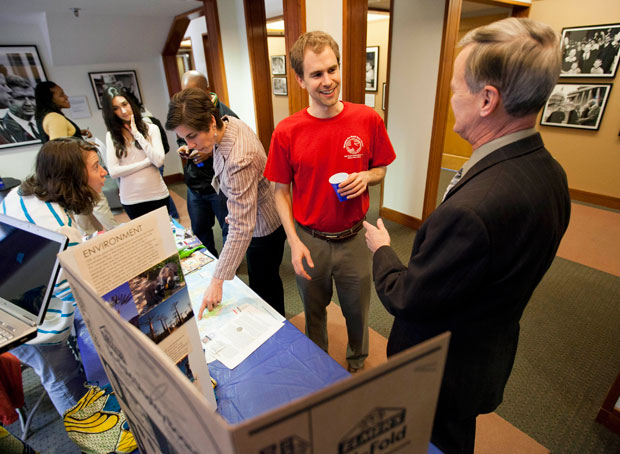
Christina Thompson has studied abroad in Costa Rica and served with DukeEngage in Ecuador, but it was only after visiting the Sanford School of Public Policy Thursday afternoon that she began thinking seriously about joining the Peace Corps.
"I've been trying to decide what to do after I graduate in May," said Thompson, a senior from Baltimore who attended a "world's fair" at Sanford where Duke graduate students who previously served in the Peace Corps set up booths where they shared their experiences, photos and souvenirs. "I'm always interested in hearing from people directly about their personal experiences, and it seems like everyone's experience with Peace Corps was positive."
The graduate students organized the event to encourage more Duke undergraduates to consider serving in the Peace Corps. Duke has traditionally ranked high among universities of its size in providing volunteers for the organization, which recently celebrated its 50th anniversary, but its undergraduate recruits dipped to 15 last year, reflecting in part a national decline in the number of positions filled.
"We are passionate about sharing our Peace Corps host countries and their culture with other Americans," said Ryan Gorczycki, a master's of public policy (MPP) student and former Peace Corps volunteer in Madagascar who recently was elected president of the North Carolina Peace Corps Association. "I hope some Duke students will be inspired like I was as an undergraduate, to see what it is like to be immersed in another culture and learn a different language while helping the community you live in."
"Peace Corps broadens your career path but what's more important is how you learn to identify a problem and come up with a solution," said Jenn McFann, who is pursuing an MBA at the Fuqua School of Business after teaching English with the Peace Corps in the country of Georgia and then working as a Peace Corps recruiter. "The level of responsibility and initiative is so much higher in Peace Corps than whatever else I would have been doing after graduation. Within a few months, I was writing grant proposals instead of getting people coffee."
McFann and most of the other graduate students who participated in Thursday's program are Coverdell Fellows at Sanford and Fuqua, a Peace Corps program that subsidizes their tuition and provides other support. Many wore colorful outfits from their countries of service.
"I felt like I really grew up" while serving as a Peace Corps volunteer in the Kyrgyz Republic, said Frank Guan, a graduate student in economics. "I gained a lot of technical knowledge in college but what I learned in the Peace Corps made me feel like I was really a child."
"You get dropped off and it's up to you to do what you need to do," agreed Anne Nuechterlein, an MBA student from Cleveland who served in Ukraine. "You may flounder at first but you learn what you'll really be good at."
Cate McCaffrey, a junior from Ridgefield, Ct., who hopes to build on her recent experience studying abroad in New Zealand, spoke with many of the graduate students, discussing what Peace Corps service is like and how she might apply. "I want to push myself far out of my own comfort zone," she said. "This could be a good way for me to grow personally while helping other people."
Julianne Shelton, an MPP student from Raleigh who served as a Peace Corps volunteer in Armenia, hopes more Duke students such as McCaffrey will make that choice. "I wish I'd done it when I first graduated," she said. "It broadens your perspective and gives you a chance to really live in another country -- not just visit, but live. It helps you get to know yourself better as an American."
[The author, the head of Duke's Office of News and Communications, served as a Peace Corps volunteer in Nepal.]
Below, Ryan Gorczycki, left, a Sanford graduate student who now heads the North Carolina Peace Corps Association, chats with Professor Tom Taylor. Photo by Megan Morr/Duke University Photography
